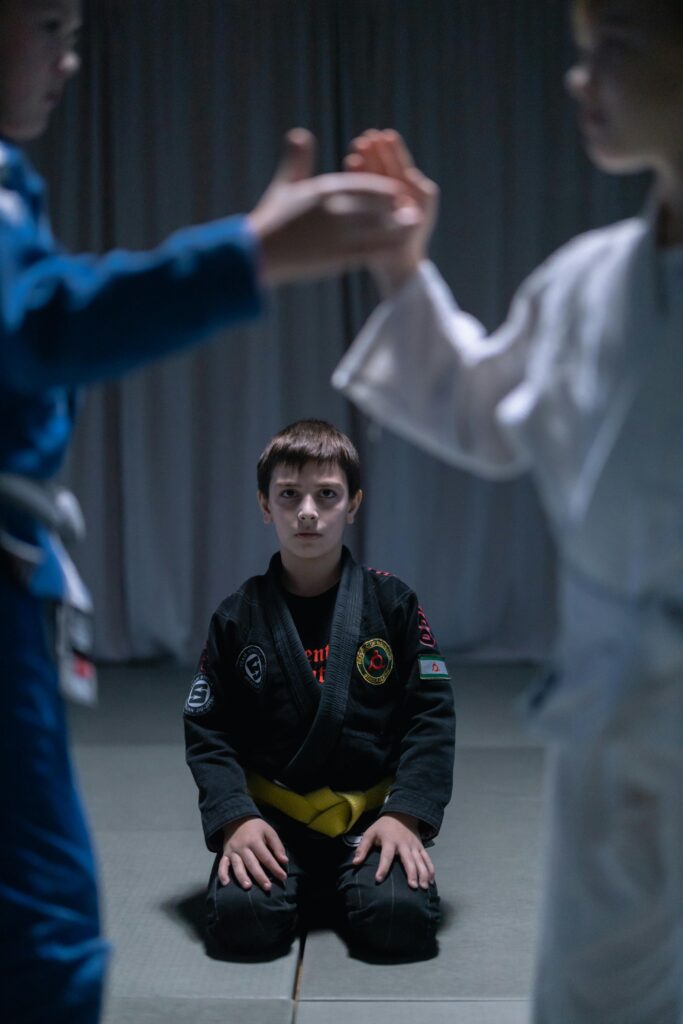Parenting is all about balance. You’re not just raising children; you’re shaping future adults who thrive when there’s structure, love, and respect.
Striking that perfect mix of discipline and affection might feel like walking a tightrope some days, but it’s the key to creating a home where rules and warmth coexist. When your children feel secure and guided, they’ll learn to grow with confidence and empathy.
At Eye2Eye Combat, we understand the challenges modern parents face, which is why we’ve teamed up with Bright Stars CDC to create Parenting Workshops. These sessions empower you with practical tools to nurture emotionally resilient children while maintaining a safe and supportive environment.
We’ll dive deeper into these workshops later—stay with us!
The Foundation of Balanced Parenting
Balancing discipline and affection means recognizing how each contributes to your child’s development.
Discipline creates boundaries and helps children learn self-control, teaching them the consequences of their actions. On the other hand, affection gives them the emotional strength and security to grow into confident, compassionate people.
Together, these elements lay the foundation for a strong, healthy family dynamic, where children thrive on both structure and love.
Understanding Discipline and Affection
Discipline isn’t about punishment or control; it’s about guiding your children with clear expectations and helping them understand how their choices shape outcomes. It’s showing them the logic behind rules so they can internalize responsibility.
Affection isn’t limited to cuddles or kind words; it’s about making your children feel valued and supported. By balancing discipline with genuine care, you create a harmonious home where respect and love coexist naturally.
Why Balance Matters
Leaning too far toward discipline can create a rigid and fear-driven environment, while too much affection without boundaries can lead to confusion and chaos.
Your children need to know that you set the rules to keep them safe and happy, but they also need to feel that you’re their ally.
Striking this balance allows you to enforce rules with empathy, ensuring they see you as both a guide and a source of unconditional love.
The Role of Consistency
Children rely on routines and predictability to feel secure. When your rules and behavior remain consistent, your children know what to expect, which builds trust.
Following through on what you say reinforces that you mean it—whether it’s a promised bedtime story or a consequence for missed chores. This predictability assures them you’re dependable, making it easier for them to trust your guidance.
Practical Techniques for Fostering Discipline
Effective discipline empowers your children to make good choices rather than fear punishment. It teaches them life skills they’ll carry forward and strengthens their ability to navigate challenges.
Setting Clear Expectations
Children thrive when they know what’s expected of them. Clearly explain rules in language they can understand and take time to discuss why these rules exist.
Doing this not only helps them follow the rules but also fosters their ability to think critically about their actions.
Example:
Instead of saying, “Stop hitting your sister,” you could say, “We keep our hands gentle because we care about each other.” This reframes the behavior as an opportunity for kindness, making the rule feel reasonable and attainable.
Positive Reinforcement and Consequences
Praising good behavior encourages children to repeat it. A simple “Thank you for putting your toys away” can make them feel proud and motivated.
When rules are broken, consequences should be logical and proportionate. If your child skips cleaning their room, you could withhold screen time or another privilege. This approach teaches accountability while maintaining respect.
Modeling Behavior
Children are natural imitators, learning more from what you do than what you say. If you treat others with respect, patience, and kindness, your children will absorb those behaviors and apply them in their own lives.
Consistently modeling the traits you want to see in them helps your guidance stick.
Incorporating Routine and Structure
Routine creates a sense of stability. Knowing what comes next in their day reduces stress and helps children stay on track.
Establish set times for meals, chores, and bedtime. For example, an 8:30 bedtime can become a comforting ritual when paired with a story or quiet moment together. These routines help discipline feel natural rather than imposed.
Nurturing Warmth and Affection
Affection isn’t just about making your children feel good; it’s the emotional glue that strengthens your relationship. When children feel deeply loved, they’re more open to accepting guidance and discipline.
The Power of Affirmations and Validation
Your words have a lasting impact. When you tell your child, “You’re so creative,” or “I’m proud of how hard you worked,” you reinforce their sense of worth.
Validation doesn’t mean agreeing with everything they say or do—it’s about showing them their thoughts and feelings matter. This simple act strengthens their self-esteem and your bond.
Active Listening and Empathy
When your child shares something, even if it’s small, stop and listen fully. Put down your phone, make eye contact, and give them your undivided attention. Respond with empathy by acknowledging their emotions.
For example, if they say, “I’m upset I didn’t get picked for the team,” you might respond, “I understand that must feel disappointing.” This builds trust and emotional security.
Quality Time Together
The time you spend together is more valuable than how much time you spend. Focus on activities that let you connect meaningfully, like cooking, playing games, or taking a walk.
Even 15 minutes of genuine interaction can leave a lasting impression. Prioritize these moments to deepen your relationship and show your children they’re important to you.
Balancing Affection Across Age Groups
Each child needs affection in different ways depending on their age and personality. A toddler might need a bedtime hug or playful tickles, while a teenager might value quiet moments to talk or simply a listening ear.
Adjust your approach based on their developmental stage to ensure your affection feels natural and appropriate to them.
Challenges and Solutions for Modern Parents
Parenting today isn’t always straightforward. We’re juggling busy schedules, shifting societal norms, and technology that wasn’t around when many of us were kids.
These challenges are real, but the good news is that you can address them with practical strategies that bring a sense of control and harmony to your home.
Managing Screen Time and Technology
Technology is a permanent part of life now, but it can be a double-edged sword. It offers incredible learning opportunities but can also steal time and focus.
I recommend creating screen-free zones to reclaim family connection. For instance, make mealtime a time for conversation, not scrolling, and establish rules like turning off devices an hour before bedtime to promote healthier sleep.
Encourage alternatives to screen time by introducing your kids to activities that spark creativity and physical engagement. Sports, reading together, or hands-on projects like crafts are excellent options.
These activities provide balance and show your children there’s more to life than screens. The structure you create around technology today sets the stage for healthier habits as they grow.
Dealing with Emotional Outbursts
We all know emotions can run high, especially with younger kids or teens navigating big feelings. When tempers flare, the most powerful thing you can do is stay calm.
Validate their emotions with a simple acknowledgment like, “I can see you’re upset.” Giving them space to express themselves shows that their feelings matter.
Once things settle, sit down with them and explore healthier ways to handle strong emotions. For example, teach them how to take deep breaths or count to ten when they feel overwhelmed.
Even suggesting a short break can help diffuse a tense situation. These small but intentional steps build emotional awareness and resilience over time.
Co-Parenting Strategies
Parenting with a partner comes with its own challenges, but consistency makes all the difference.
Children feel more secure when caregivers are on the same page about rules and expectations. Take time to sit down together and discuss a clear plan for discipline and routines.
When you and your partner work as a team, presenting a united front, it not only strengthens your partnership but also sets a strong example for your children.
Disagreements are natural, but keeping them away from the kids and addressing them respectfully behind closed doors protects their sense of stability.
When to Seek Professional Guidance
Sometimes, the challenges we face as parents feel bigger than what we can handle alone.
Persistent behavioral issues or emotional struggles may signal the need for outside help. Seeking support isn’t a sign of failure—it’s a proactive step toward solutions.
Therapists, counselors, and parenting workshops can offer valuable insights and techniques tailored to your family’s needs.
Whether it’s addressing anxiety, behavioral changes, or developmental delays, professional guidance provides tools to create a healthier, more harmonious environment for your child.
Parenting Workshops: Building Skills Together
To help parents like you navigate these challenges, our Parenting Workshops, created in collaboration with Bright Stars CDC, provide a hands-on, empowering approach.
These workshops combine practical techniques and resources that make it easier to balance discipline and affection while ensuring safety and growth for your family.
Teaching Respectful Communication
Words have power. The way you communicate with your children shapes how they view themselves and others.
In these workshops, we teach strategies to manage disagreements constructively. You’ll learn how to keep emotions in check and model the respectful communication you want your kids to emulate.
For example, instead of reacting with frustration, we focus on responding thoughtfully. Techniques like pausing to reflect or choosing affirming language show your children that respect isn’t just a rule—it’s a value.
Creating Healthy Boundaries
Boundaries are essential for every family. They aren’t walls to keep people out; they’re frameworks to keep relationships strong.
During the workshops, we explore ways to define clear roles, establish daily routines, and create accountability systems that work for both parents and kids.
When you model healthy boundaries—whether it’s limiting work calls during family time or teaching your children to respect personal space—they’ll learn to carry those skills into their own relationships.
These workshops give you the tools to enforce rules with love and fairness.
Self-Defense and Situational Awareness for Families
Safety is just as crucial as emotional well-being. The workshops include self-defense training and situational awareness, giving you and your children practical tools to navigate the world confidently. It’s not just about physical skills; it’s about mindset.
For instance, knowing how to recognize and avoid unsafe situations is just as important as learning how to respond if one arises.
These hands-on sessions are empowering for parents and kids alike, fostering confidence and a sense of control in uncertain moments.
Resources and Support
We don’t just teach skills—we provide tools to make learning stick. Participants receive workbooks and audio guides that reinforce what’s covered in the workshops.
These resources allow you to practice at home, track your progress, and reflect on your parenting journey.
The support doesn’t stop when the workshop ends. You’ll leave with actionable strategies and a community of parents who share your goals. These tools keep you grounded, ensuring that what you learn translates into lasting change for your family.
Build the Skills You Need for a Safer, Happier Home
Balancing discipline and affection isn’t complicated when you have the right strategies. By focusing on clear communication, meaningful connections, and consistent boundaries, you can create the kind of family dynamic where everyone thrives.
If you’re looking for guidance to make this a reality, join our Parenting Workshops. This partnership between Bright Stars CDC and Eye2Eye Combat blends child development expertise with hands-on safety training, giving you practical tools that actually work.
Ready to grow as a parent and empower your family? Join us today and discover how to make your home a place of confidence, respect, and warmth.
FAQs
How can I set boundaries without being too harsh?
Establish clear, consistent rules and communicate them calmly. Use positive reinforcement to encourage good behavior, and when needed, apply fair, logical consequences. This approach maintains discipline while showing your child love and respect.
What if my child sees discipline as unloving?
Explain that discipline is a form of care aimed at their well-being. Share examples of how boundaries keep them safe and help them grow. Open communication fosters understanding and trust.
How do I balance affection and discipline with a strong-willed child?
Stay consistent with rules and consequences, but also listen to their feelings. Offer choices within set boundaries to give them a sense of control. This balance helps them feel respected while understanding the importance of discipline.
Can too much affection undermine discipline?
Affection supports discipline when balanced properly. Show love and warmth, but maintain clear expectations and consistent consequences. This combination helps children feel secure and understand the importance of boundaries.





